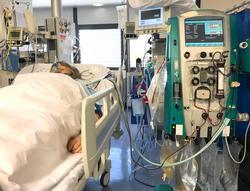
You might be wondering what dietitians have to do with the COVID-19 response. It isn’t a foodborne illness and no diet or supplement will stop you catching the disease.
Well, we asked our Critical Care Specialist Group to answer a few key questions to explain the absolutely critical role dietitians are playing to save lives on the front line of the COVID-19 pandemic.
What have dietitians got to do with the COVID-19 response?
“Most patients in the intensive care unit (ICU) will be sedated, ventilated and will have nutrition, hydration and medications delivered through feeding tubes. Feeding tubes are used to deliver the protein and calories required to meet the demands on the body, during critical illness. In some cases, nutrition and hydration will be delivered directly into the vein.
“Dietitians are essential to ensuring that nutrition is delivered in the safest way for each patient. Dietitians are experts in assessing the nutritional demands on the patient taking into account the age, gender and other underlying medical conditions the patient may have.”
What do critical care dietitians do to fight COVID-19?
“Specialist critical care dietitians work with people who have been admitted to the ICU in a life-threatening condition. They have highly developed knowledge, skills and expertise to manage the complex issues seen in critically unwell patients.
“The drugs used to sedate people in ICU contains calories (from fat) which need to be accounted for when prescribing feeding regimens. Overfeeding calories is harmful to ICU patients during the acute phase of illness.
“Multi-organ failure is another complication seen in critically unwell patients. Dietitians need to take into consideration the treatments and interventions patients are having, to ensure nutritional needs are met safely. The patient condition can change quickly during an ICU admission, critical care dietitians have to be flexible and reactive to changes which occur.
“During the COVID 19 pandemic, critical care Dietitians also have a huge role in upskilling and training non-critical care dietitians, to assist in managing the increasing numbers of critically ill patients being admitted. This involves training our colleagues how to assess and recommend nutrition, tailored to each individual patient.
“Currently, critical care Dietitians are creating and disseminating standard feeding protocols to be started in newly admitted patients to the ICU, to ensure patients are fed before being assessed by the dietitian.”
Why do we need dietitians in hospitals to fight COVID-19?
“It is well known that patients have a shorter length of stay in ICU when a dietitian has assessed and prescribed nutrition. Patients can experience malnutrition, changes in eating patterns and have a poor appetite before, during and after critical illness which can directly impact on recovery and rehabilitation.
“We also have extended roles, where we can place feeding tubes to provide nutrition directly into the gut, if patients are unable to tolerate nutrition delivered into the stomach. Some COVID 19 patients are nursed face down (prone) and can result in less feed being delivered.
“The dietitians goal is to ensure the patient receives the right amount of nutrition to aid recovery from their acute illness and to support their on-going rehab when they recover.”
What about roles other than ICU?
Of course, on top of all of this, dietitians continue to support people with other health conditions, many of who may be self isolating or shielding because they are at increase risk of infection.
They are using technology to provide advice clinics and support people remotely. We are also providing lots of public health information to help the public at large stay healthy and safe during the crisis on our public advice pages.

